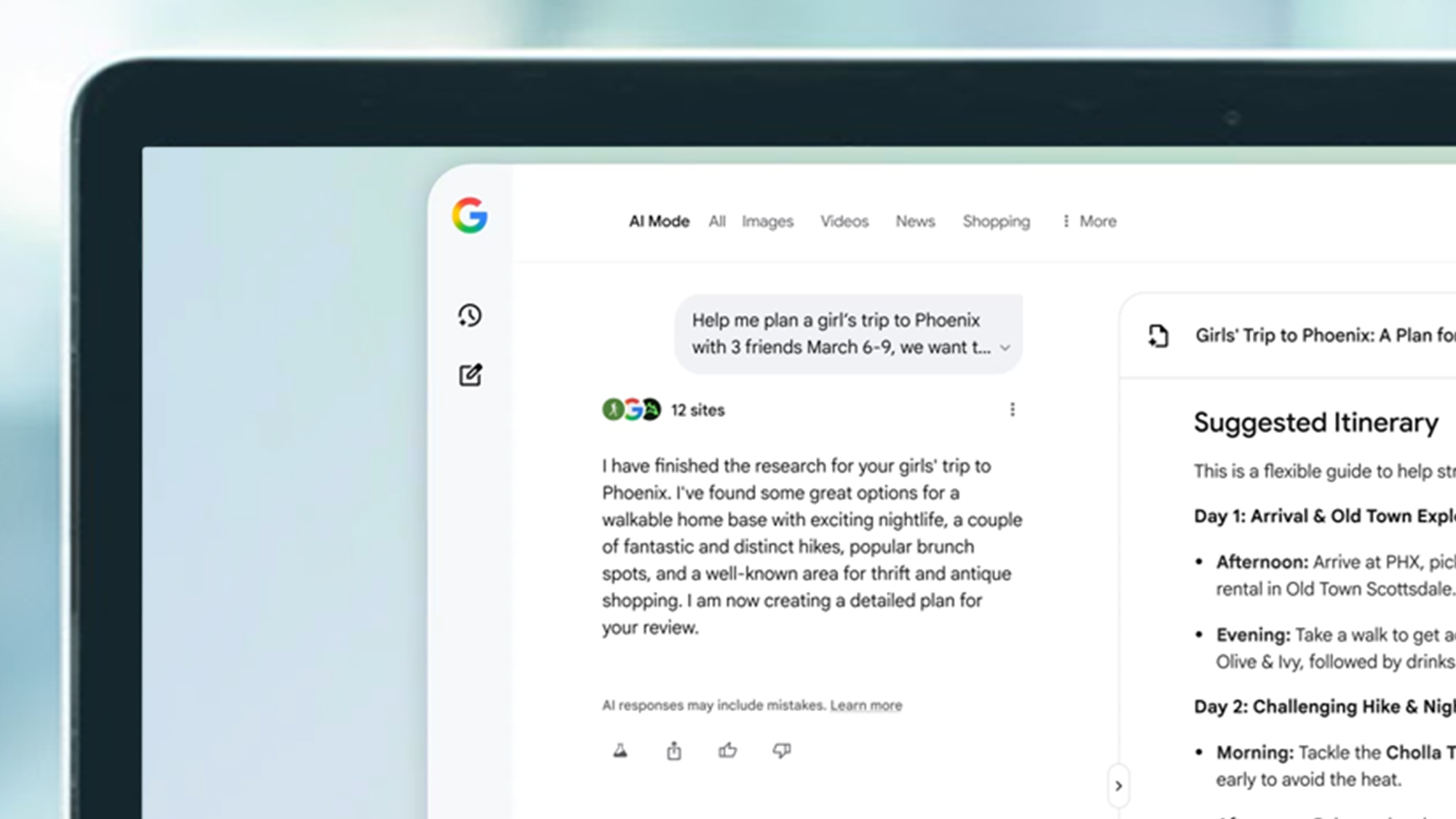Planning a trip? These 3 new Google AI tools could save you a lot of time and money
AI will soon be able to book your flights and hotels too

Sign up for breaking news, reviews, opinion, top tech deals, and more.
You are now subscribed
Your newsletter sign-up was successful
- Google has upgraded its AI-powered travel tools
- The AI can plan custom itineraries, find flight deals, and handle reservations
- Agentic booking will reserve restaurants, tickets, and appointments directly from Search, with flights and hotels coming soon
If you’ve ever tried planning a vacation and found yourself drowning in tabs, Google has some news that might make your holidays a little less chaotic. Or at least reduce the tab clutter. Google rolled out a trio of travel upgrades powered by its AI Mode in Search.
The features aim to ease the most annoying parts of travel planning: comparing too many options, flipping between booking sites, and trying to figure out where to stay, eat, and what to do in between eating and sleeping. The new tools include smarter itinerary building with Canvas, global expansion of its AI-powered Flight Deals search, and expanded agentic booking capabilities.
The biggest change is thanks to the new Canvas for Travel within AI Mode, designed to help you plan a journey. It helps build custom itineraries based on requests as simple or detailed as “I want to take a five-day trip to Austin with my family next spring and get in some good barbecue and live music not too far from the hotel.” The AI will immediately start assembling a plan inside Canvas.
The plan that pops up pulls together real-time data from Google Flights and Hotels, reviews and photos from Google Maps, and curated info from across the web. You’ll get options, suggestions, and comparisons, like which hotel has better reviews for its breakfast versus which one has the pool your kids will actually use.
And it’s not a static spreadsheet either. Canvas is interactive, so you can nudge it toward better brunch spots, make tradeoffs based on location, or ask the AI to update your plans if your flight dates shift.
Flights and virtual agents
And the AI in Flight Deals could reduce the cost of your trip. After testing in the U.S., Canada, and India, Flight Deals is now global in over 200 countries and supports more than 60 languages.
The idea is that you don’t need to know exactly where or when you want to go. Just type something like “cheap flights for a long weekend from New York in February” or “someplace warm with beaches and good food,” and Flight Deals will generate a list of destinations that fit based on affordability, timing, and traveler preferences.
Sign up for breaking news, reviews, opinion, top tech deals, and more.
It's the expanded agentic AI for bookings that really grabs attention, however. Google has now extended agentic booking capabilities to more U.S. users in AI Mode, starting with restaurants. You describe what you want, and it goes to work, searching across OpenTable, Resy, and Tock to find real-time availability that fits your request, and offering a short list with booking links ready to go.
For U.S. Labs users, that same magic is also available for event tickets and local appointments. You can now start a plan with a single sentence instead of seven browser tabs and a phone call.
Booking for flights and hotels isn’t ready yet, but Google says it’s coming, as shown in the demo below. The company is already collaborating with major travel partners like Expedia, Marriott, Booking.com, and Wyndham to build out direct booking through AI Mode in the near future.
In theory, this could create a seamless loop where your vague desire for “a sunny, relaxing getaway in early March” becomes a full itinerary, complete with flights, a hotel near the best-rated tacos, an afternoon spa appointment, and a reservation for sunset cocktails, all without ever leaving the search bar.
The usual concerns about bias and privacy are, as always, left only vaguely addressed by Google. But for now at least, Google’s pitch isn’t about replacing human judgment, just saving people time.
There are also practical implications for how we decide where to go and what to do. On the positive side, AI nudging us toward more affordable flights and recommending off-the-radar experiences is a nice way to expand people's horizons. Then again, too many people might just ruin those vistas.
Whether it changes the future of travel remains to be seen. But if it means one less argument over who forgot to book the hotel, it might be worth letting AI navigate or even take the wheel for part of the journey.
Follow TechRadar on Google News and add us as a preferred source to get our expert news, reviews, and opinion in your feeds. Make sure to click the Follow button!
And of course you can also follow TechRadar on TikTok for news, reviews, unboxings in video form, and get regular updates from us on WhatsApp too.

➡️ Read our full guide to the best business laptops
1. Best overall:
Dell Precision 5690
2. Best on a budget:
Acer Aspire 5
3. Best MacBook:
Apple MacBook Pro 14-inch (M4)

Eric Hal Schwartz is a freelance writer for TechRadar with more than 15 years of experience covering the intersection of the world and technology. For the last five years, he served as head writer for Voicebot.ai and was on the leading edge of reporting on generative AI and large language models. He's since become an expert on the products of generative AI models, such as OpenAI’s ChatGPT, Anthropic’s Claude, Google Gemini, and every other synthetic media tool. His experience runs the gamut of media, including print, digital, broadcast, and live events. Now, he's continuing to tell the stories people want and need to hear about the rapidly evolving AI space and its impact on their lives. Eric is based in New York City.
You must confirm your public display name before commenting
Please logout and then login again, you will then be prompted to enter your display name.